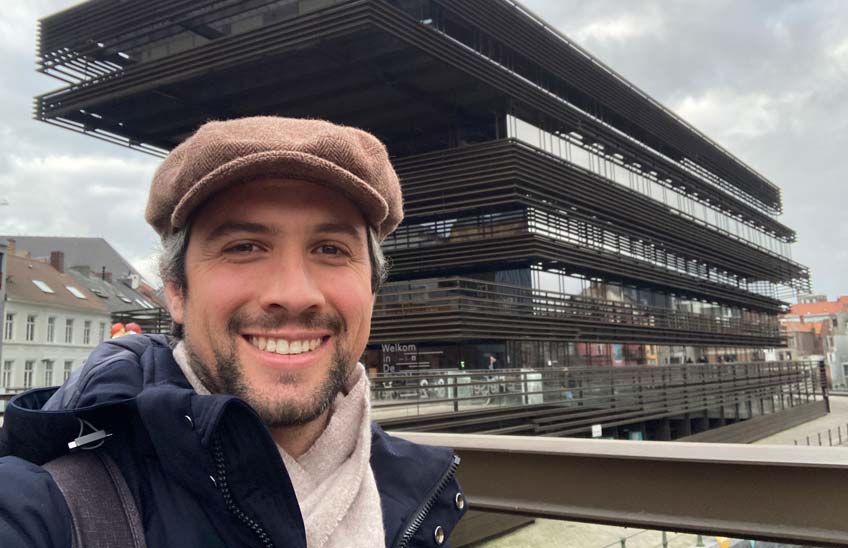Aurelio Fernández, researcher of the ICS, stays in Ghent at the framework of new programs of study on interpersonal relationships in young people.
The Chilean researcher is doing a double doctorate at Ghent University and the University of Navarra, so he spends half of each academic year in the Belgian city.

FotoCedida<br>/El investigador del ICS Aurelio Fernández durante su estancia en la Ghent University.
14 | 02 | 2024
The researcher predoctoral Aurelio Fernandez, from the group 'Youth in transition' of the Institute for Culture and Society (ICS) of the University of Navarra, has just returned to Pamplona after his seven-month stay at Ghent University. He is doing his double doctorate on the social interactions of young people between 18 and 25 years old at this academic center and at the University of Navarra, so each year he resides for a period in the Belgian city.
Thus, between June 2023 and January 2024, Fernandez has had the opportunity to work, directed by Professor Mariek Vanden Abeele, at department UGent Communication, specifically at group of research imec-mict-UGent. "It is proving to be a very enriching experience. It is a very interesting group , consisting of about 50 researchers. Being part of two research groups in both places financial aid me to be very focused on academia," he values.
The work of these months has allowed him to advance in different articles, in partnership with Professor Vanden Abeele, his directors in Spain, Charo Sádaba and Javier García-Manglano, and other international researchers, an opportunity favored by the stay. In order to be able to carry it out, she has had an international scholarship of mobility granted by the Government of Navarra.
One of the articles generated during this stage proposes "a new approach on the quality of social interactions". To this end, a year and a half ago it gathered data from a group of participants who used a mobile application for a given period of time. Daily they received a questionnaire with some questions about their well-being and the social interactions they had recently had. Specifically, he collected two instructions from data: one involved 140 young Spaniards for two weeks, answering 8 questionnaires daily; the second involved 280 young Spaniards for 4 weeks, answering 5 questionnaires daily.
Another paper in which he is using these data studies the effect on daily and weekly levels of well-being of "some social interactions that are of more extreme values in their quality, i.e., very good, in which the person feels highly valued by the other and has a very positive impact on the relationship, or vice versa". This article is being written at partnership with researchers Robin Achterhof, Erasmus University Rotterdam (The Netherlands), and Netta Weinstein, Reading University (UK).
During these months he has also finished two other articles signed with researchers from other universities and centers. In one, he explores how face-to-face and technology-mediated interactions - in particular, the quality of these interactions - influence people's momentary well-being. In the second, he analyzes the impact on time goal of mobile device use, linking it to participants' state of well-being, repeatedly reported in participation in these programs of study.
In addition, the stay has allowed him to participate in a lecture of the Interpersonal Communication and Social Interactions division of the European Communication Research Education Association (ECREA), held in Tallinn (Estonia). At the meeting, she presented two papers: Why we interact? The desire, the need, and the ability and Social Interaction Quality as a relational experience. "It has been an excellent opportunity to present my research and to generate links with other European researchers who are studying interpersonal communication," says Fernandez.
He also presented the second article to the next lecture of the International Communication Association (ICA), to be held in June in Gold Coast (Australia). It has received recognition from the Interpersonal Communication division.
